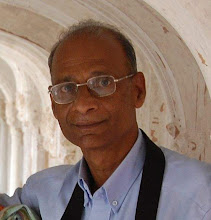By the evening, I wait for the Gundecha Brothers, the famous drupad singers. The hall is almost a quarter filled. The programme is jointly arranged by the Fine Arts Society of the city and a bank employees organization which has organized over 200 such events. By ten minutes past the starting time, the crowds entered and filled a half of the hall and the tanpura started sounding the start, OK, the beginning for a longer word.
Suddenly the curtain opens and an introduction about the chandha- prabandha style of drupad singing is read out in impeccable pronunciation. Then the long tuning process. Tuning the instruments and the vocal chords of the singers and the auditory perception of the audience and even the air around. Then they sang Bimpalasi and interpolated the time. Matras and tanmatras, nanoseconds and molecules mixed up in a mood, this elated one of their raga, so methodically explored, keeping the time standing by and watching the way the sounds and movements being created and dissolved on stage. From behind the large flakes of graying shades emerged the music. Waves after waves the notes and tones and ragas filled the stage. Centuries of singing intermingled, keeping the same beats, the same tones, the same swaras into an elaborate harmony of nanoseconds and molecules, all emerging and disappearing to the beats of the same rhythm, the one played on Shiva’s thudi, the damaru, the ultimate drum.
One of the Gundechas played the drum, the pakwaj, the mrudangam of the north. Later Great Amir Khusro cut it into two making the dakkan and the bayan of the tabala. Drupad being a form of the pre-Khusro period, still used the pakwaj. Abheri of the south was Bimpalasi for them. Next they sang Bhairav. The dawn with its brightening grays and the morning notes of all birds and bees reverberated in meaningless sounds rhythmically produced to the strictest of regimens and yet flowing into melodies of old. As time whirl pooled and at times stopped itself in shades, one behind the other into the future [or say the past] and lost the directions, the collective voice of all people and other beings and all things and even non-things made the music, so melodious, so full of feelings that they spilled all the rasas and bhavas – the moods and melodies of old, continuing into the future.
It had started with samagana. Rathantharam is a famous piece. Even Gayatrisamam is great. RK Mission’s Mylapore Kendra has brought it out in cassettes. Even the tone is reflected in drupad because it inherited the samam singing. The tans were so elegant and harmonized in such an excellent way that the resonance stayed even after the programme got over and the brothers were honored and the girl who compeered got a special prize. Music lasts over events and centuries. May the fame of these brothers too last for ever.
Wednesday, February 21, 2007
Subscribe to:
Post Comments (Atom)

No comments:
Post a Comment